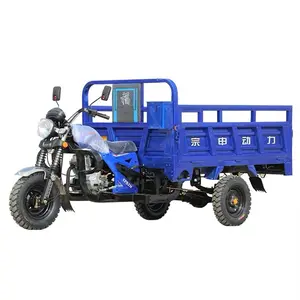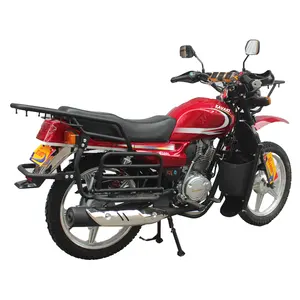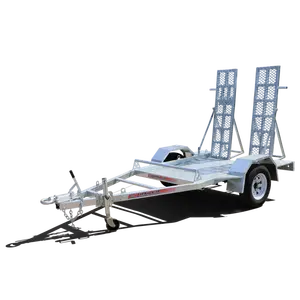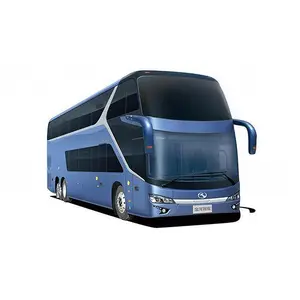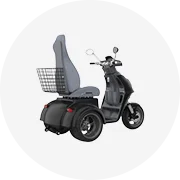Popular in your industry






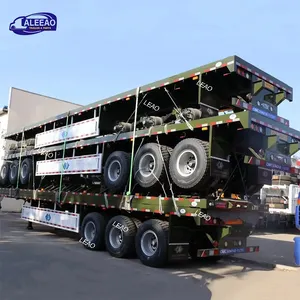














































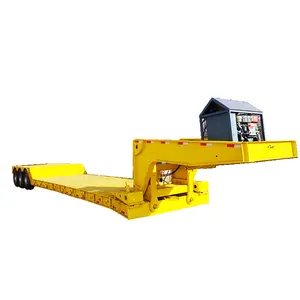


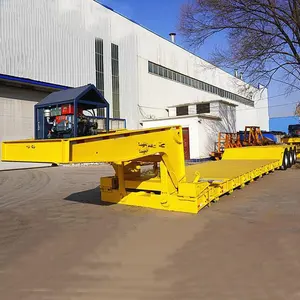
















































































































































































Top categories
About 100 ton trailer
The Role of Heavy-Duty Trailers in Transport
Engineered for resilience, heavy-duty trailers are indispensable for moving oversized, cumbersome, or hefty loads that surpass the capabilities of standard vehicles and lighter trucks. These trailers are pivotal across a multitude of sectors, including construction, agriculture, logistics, and manufacturing, facilitating the conveyance of substantial machinery, equipment, and materials vital for operational efficacy at work sites and between points of origin and destinations.
Heavy-duty trailers are constructed using superior materials and engineering to endure the substantial weight and dimensions of their freight. This encompasses the utilization of steel, aluminum alloys, and other robust components designed to support considerable burdens. To evenly distribute weight and ensure stability, these trailers typically feature multiple axles and wheels, alongside sophisticated suspension systems.
Equipped with a suite of features to bolster safety and functionality, heavy-duty trailers may include air brakes, ABS systems, and reflective markings to enhance visibility. Their design also addresses the necessity for straightforward loading and unloading, incorporating elements such as ramps, hydraulic lifts, or tilting beds.
Varieties of Heavy-Duty Trailers for Transport
Diverse types of heavy-duty trailers are available to meet specific transport requirements:
-
Lowboy Trailers: Distinguished by their reduced deck height, lowboy trailers enable the transport of tall equipment that would otherwise exceed the height limitations of standard trailers. Typically, their height does not surpass 36 inches, which provides a lower center of gravity and enhances stability.
-
Flatbed Trailers: Offering an unenclosed deck, flatbed trailers afford the utmost versatility in the loading and unloading process. They are commonly employed for the movement of bulky construction equipment and materials, which can be loaded from either the top or sides.
-
Dump Trailers: Known as tipper trailers, these vehicles are equipped with a hydraulic lift system that enables the transportation and efficient unloading of bulk materials such as sand, gravel, and demolition debris. They are particularly prevalent in the construction sector for moving substantial loads across short distances.
-
Tank Trailers: Specifically designed for the carriage of liquids or gases, tank trailers feature a cylindrical tank and are often capable of transporting corrosive substances. They are integral to industries like fuel transport, chemical logistics, and the movement of food-grade materials.
-
Lowboy Trailers: These trailers possess one or more low-profile decks, which are conducive to hauling tall equipment with a reduced center of gravity. They are especially useful for the long-distance transport of heavy machinery.
Selecting the Right Heavy-Duty Trailer for Transport
Choosing the appropriate heavy-duty trailer for your enterprise requires contemplation of several key factors:
-
Load Capacity: Ascertain the heaviest weight of cargo to be transported to determine the necessity for a single or multi-axle trailer.
-
Material: The material of the trailer influences both its longevity and heft. Options range from steel, aluminum, iron, to stainless steel. While steel is sturdy and often more cost-effective, it tends to be heavier; aluminum, conversely, is lighter and resistant to rust but may come with a higher price tag.
-
Tire Size: Larger tires can bear heavier loads by dispersing the weight over a broader area, an important consideration for trailers carrying heavy equipment.
-
Braking System: The choice between hydraulic or electric brakes should be made based on the load requirements and the towing vehicle's braking capacity.
-
Use Case: The intended application, be it construction or agriculture, will dictate whether a flatbed, dump bed, or lowboy trailer is most apt.
An informed decision that aligns with your specific needs and budgetary limits can be made by meticulously weighing these factors, ensuring the safe and efficient transport of your cargo.
Heavy-Duty Trailers for Transport on Alibaba.com
Alibaba.com is a premier online marketplace that aggregates an extensive array of heavy-duty trailers suitable for the transport of various vehicles and equipment. With over twenty years of experience in fostering B2B transactions globally, Alibaba.com has become an indispensable tool for businesses in search of dependable logistics and transportation solutions. The platform's broad network of suppliers presents products that meet rigorous standards of quality and functionality, while also accommodating bespoke needs.
The heavy-duty trailers featured on Alibaba.com are available in materials like steel and aluminum alloys, ensuring durability and security during transit. Additionally, businesses can discover trailers with amenities such as side curtains for protection against the elements or specialized loading ramps to streamline operations. Whether you require a flatbed for efficient urban transport or an enclosed box trailer to protect fragile goods on extended journeys, Alibaba.com is poised to meet a diverse array of needs while guaranteeing customer satisfaction.
Alibaba.com eases the procurement process by offering tools that facilitate communication with suppliers in the buyer's local language and manage orders conveniently via mobile access. With services like Trade Assurance that safeguard payments until delivery confirmation and support for tailored requirements, Alibaba.com stands as the optimal platform for procuring heavy-duty trailers that meet specific business demands, all the while maintaining a reputation for reliability and quality assurance in international commerce.
Frequently Asked Questions About Heavy-Duty Trailers for Transport
What is the primary material used in constructing heavy-duty trailers for goods transport?
Heavy-duty trailers are predominantly constructed from materials like steel, iron, and occasionally aluminum alloys, selected for their robustness, endurance, and capacity to bear loads.
How do I ascertain the suitable trailer size for my business's needs?
To determine the appropriate trailer size, consider the dimensions and weight of the items you intend to transport. Ensure the trailer's dimensions are sufficient for the load and comply with legal road transport limits.
What types of heavy-duty trailers are available for transporting construction equipment?
A range of heavy-duty trailers is designed for the transport of construction equipment, including flatbed trailers, lowboy trailers, and specialized trailers equipped with features such as ramps and tie-down points.
Can heavy-duty trailers be tailored to specific business needs?
Indeed, heavy-duty trailers can be customized to meet particular business requirements, with options for adjustable deck heights, load capacities, and additional features like toolboxes and tie-down points.
Are foldable heavy-duty trailers an option?
Foldable heavy-duty trailers are available and are ideal for businesses that frequently transport goods but may not need a trailer when not in use.
How can I ensure the heavy-duty trailer I select is compatible with my existing fleet?
Verify the trailer's specifications, particularly the hitch type and compatibility with your vehicles. It's essential that the trailer's design is congruent with your current fleet to ease operations and enable seamless integration.
What considerations should I have regarding tires and wheels when choosing a heavy-duty trailer?
When selecting tires and wheels for a heavy-duty trailer, consider the expected load-bearing capacity. Larger, sturdier tires are better suited for heavier loads and uneven terrain, while standard tires may be adequate for lighter loads and smoother roads.
Is there a standard warranty for heavy-duty trailers?
Warranty terms can vary by manufacturer. It is crucial to discuss warranty specifics with the supplier prior to purchase to comprehend the extent and duration of the coverage.
How does a heavy-duty trailer's suspension system influence its performance?
The suspension system plays a significant role in the trailer's stability and the comfort of the ride. Air suspension systems, for instance, provide a gentler ride and are advantageous for the transport of delicate or heavy items over considerable distances.
What safety features are advisable in a heavy-duty trailer?
Desirable safety features may encompass robust construction, effective brakes, lighting and reflective elements, and occasionally specialized components like side guards. It is imperative to consider the nature of the cargo and choose a trailer with suitable safety features.
Are there environmentally friendly options for heavy-duty trailers?
While traditional metal trailers may not be explicitly marketed as environmentally friendly, selecting trailers made from advanced materials or those with fuel-efficient designs can contribute to reducing environmental impact.
